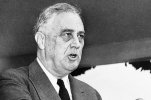This. A "healthy" Humphrey is actually not that implausible. All that is required is a bladderless Humphrey, and, as mentioned, he was given the option to have it removed in 1971 (I thought 1970, but admit I'm not sure) and chose not to.
The next hurdle to get Humphrey to the White House is that he must choose to run in the primaries. For an old school politician like Humphrey who had once won the nomination without going through this new ritual, this is easier said than done. However, he may look at his '72 loss and learn the right lesson: He had to enter the primaries early and campaign in a big way. If he did, he can win Iowa. Carter's strong second place showing will likely be the story -- the press craves a horse race and hates a coronation.
New Hampshire, with its contrarian streak, may also be a bit difficult, but ultimately Humphrey will have the superior operation and should dispose of Carter before the Convention (though I think it might be closer than most of us are inclined to give Jimmy credit for).
Humphrey likely follows Carter's lead and goes forth with the Panama Canal Treaties, which riles the right. That said, he likely also pursues health care reform with Kennedy at his side. We have a tendency, I think, to blame Carter for the lack of health care reform, but the truth is, the votes for Kennedy's bill were likely not there, and to get Kennedy to agree to a smaller package, you're going to need to go through a pretty difficult legislative battle in which you bleed political capital ahead of the Midterms. Success is no guarantee, but the Democrats can probably cobble together a modest health care reform measure.
The question of a Humphrey second term comes down to two matters: the economy and the Hostage Crisis. Starting with the latter, Humphrey is an interesting person to put in the Oval when the Shah needs refuge. In some ways, he's less likely to cave to the foreign policy manipulations of Kissinger and Rockefeller. At the same time, he is himself a cancer survivor and the condition of the Shah was greatly exaggerated to Carter and would be to Humphrey, too. I can't say I know enough to predict whether he takes the Shah, but there's also the possibility that Thatcher, who considered it, does ITTL and the issue isn't one Humphrey has to confront.
It's also possible that, should Humphrey take the Shah, he evacuates the embassy personnel or strengthens security forces at the embassy after the February 1979 attack. Had Carter done that, the November crisis would've been avoided. It seems plausible that Humphrey could do that.
And, if the hostages are taken still, Humphrey is less likely to obsess over them than Carter did. Carter's preoccupation with them brought the round-the-clock attention on the issue, which eventually sapped his approvals, and prevented him from a number of early military decisions that may have brought about their release, namely mining the ports around Iran or instituting a naval blockade.
With how many variables there are, it seems highly unlikely that the Hostage Crisis unfolds in the way it did for Carter.
Second, the economy. There is almost no way that Humphrey appoints Volcker, whose tenure at the Fed greatly contributed to Carter's defeat. Almost any other Democrat would have appointed a more politically-minded Chair who would not have instituted the kind of Shock that helped give Carter the boot. By no means will you have a bustling economy in 1980, but you may have one that's improved from OTL, and that would allow the election to be shifted to foreign policy, an issue where Reagan trailed Carter significantly, even with the Hostage Crisis. If you have Humphrey move in to make a military decision that gets the hostages released after a month or two, the contrast between his steady approach and Reagan's would be stark, and without a totally dreadful economy, voters may let their distrust of Reagan in a room with the big red button get the better of them.
Now, the question is who succeeds Humphrey. I tend to agree with
@LivingSteam that 1984 will be a good year for Democrats if Humphrey has managed to win reelection in 1980 -- not assured but well within the realm of plausibility.
Carter himself could be Humphrey's running mate. He would've said yes if asked, he would help tame Humphrey's image as an insider in the post-Watergate world, and he would have exceeded expectations enough that some considered him a good campaigner. That said, he would be, interestingly, the case of a VP who may very well lose the nomination when trying for it. It is doubtful he would've made too many friends after eight years, and he would've been vulnerable to a number of Democrats.
The problem, I think, with Bentsen, is that the appetite to move to the center will not be there if Humphrey has had a strong eight years. If Bentsen is the VP, which he may well be, that's one thing, but he's unlikely to topple a sitting VP.
Interestingly, two plausible running mates, Church and Scoop, did not survive to 1984 IOTL. Either could be chosen and then be replaced by someone else later on -- in which case Humphrey may choose Muskie, who would likely be Sec. of State in a second term and was Humphrey's '68 running mate. I don't think Humphrey would choose him from the start in '76, though.
Wikipedia also mentions Glenn and Stevenson. Both are plausible. Mo Udall is another plausible choice. I honestly think Carter might be his choice for a running mate, and then you could see T. Kennedy or Mo Udall or Gary Hart or Mondale overtake Carter in the '84 primaries.
